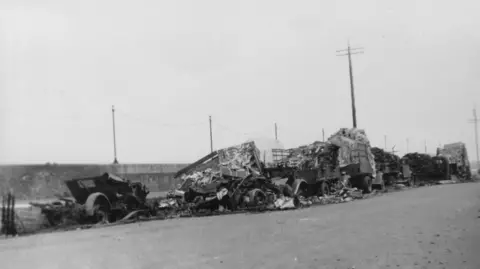WW2 bombing 'blackest day' in Guernsey history
 J C Allain/Simon Hamon
J C Allain/Simon HamonThe World War Two bombing of tomato trucks in St Peter Port harbour has been described by a local historian as the "blackest day" in Guernsey history.
Thirty-four people were killed and 33 were injured when German planes bombed the trucks after mistaking them for troop vehicles on 28 June 1940.
The air raid on St Peter Port heralded the beginning of the German occupation of the island, which lasted for five years.
Historian Simon Hamon said it was important to remember the "tragic day", and the impact it had on island families, 85 years after the event.
"It really was Guernsey's blackest day in its history, and certainly that in the occupation," said Mr Hamon.
"Everybody had their vehicles loaded high with tomatoes, and to keep the sun off them they used to cover them with tarpaulins.
"German planes had been coming over in the days in advance and had seen these trucks and mistakenly identified them as troop-carrying trucks that were unloading supplies and men, unaware of the tomato export at the time."
'Bullets whizzing through'
A total of nine German Heinkel HE-111 bombers started bombing targets within the harbour area at about 18:45 BST.
"People decided to dive underneath the vehicles in a hope of saving themselves, but of course with bombs and bullets whizzing through it didn't really help them very much," said Mr Hamon.
"There were 33 people altogether that are classed as dying there.
"There were over 50 that had extensive critical injuries, which were treated, and managed to survive."
'Losing a father'
Mr Hamon said the true number of people injured has not been recorded as people with minor injuries "treated themselves".
"It was a tragic day really, with one family losing a father and two sons, and the youngest of the sons I think was 14," he said.
A service was held at St Peter Port harbour on Saturday evening to remember the people who were lost in the bombing.
"Although they weren't combatants, they weren't fighting anybody, they were probably the first islanders to have been killed in World War Two," said Mr Hamon.
"We should remember that, and we shouldn't lose sight of war and the effects of war on us and wider populations.
"The bombing occurred just two days before the occupation of the island by German forces."
Follow BBC Guernsey on X and Facebook and Instagram. Send your story ideas to [email protected].
